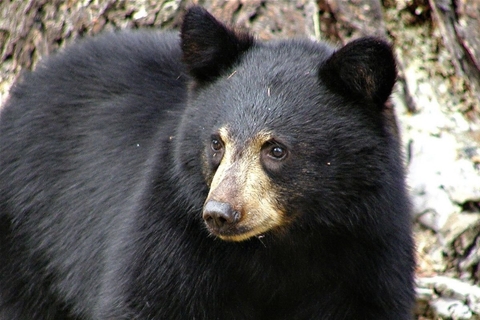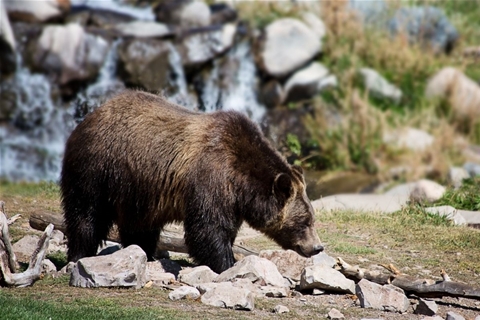Bear
In the Kootenay region there are two types of bears. Black bears and grizzly bears.
Black Bear Facts:
- Adult males measure between 60-90 cm at shoulder height and weigh anywhere from 80-300 kilograms.
- Bears go into a deep sleep or denning period, usually from November through to April.
- Bears lose approximately 30% of their weight over the winter.
- Because bears need such great stores of fat to make it through the winter, they become voracious eaters and can consume over 20,000 calories a day.
- Bears have an extremely good sense of smell and can smell food from over a kilometer away.
- Bears have eyesight and hearing as good as, or better than, that of humans.
- Bears are extremely fast and can run equally as well uphill or down.
- Bears mate in late June and embryos do not implant until the fall and only do so if the female has sufficient stores of fat to support the young through the nursing period in the den.
Grizzly Bear Facts:
- Adult males on average measure between 90-110 cm at shoulder height and can weigh upwards of 500 kilograms.
- Grizzlies have large front claws that are especially good at digging. They dig for both rodents and for the roots of certain alpine plants.
- Grizzlies can climb trees even though their long claws are not well adapted for it.
- Because grizzlies need such great stores of fat to make it through the winter denning period they become voracious eaters and can consume over 20,000 calories a day.
- In some areas grizzlies target the nuts of the White-bark pine as a major food source. They get these nuts by raiding squirrel caches.
- Attacks by Grizzly bears are usually the result of a defensive encounter so avoiding an accidental encounter is your best tactic in terms of bear safety.
- Although usually solitary, grizzlies will congregate and tolerate other gizzlies when there is sufficient food.
- Grizzly bears occupy much of the BC landscape but have never established.
Bear Safety Tips!
Remember that bears can react different in certain situations.
- When hiking, travel in groups of two or more and keep talking (talk out loud to yourself if you are on your own). Bears recognize the human voice and will avoid you in most instances.
- Carry bear spray with you when hiking in bear country.
- If you encounter a bear, do not yell, scream, or run as this may trigger an attack. If the bear sees you, speak in a low voice to let the bear know that you are a human and move away slowly.



